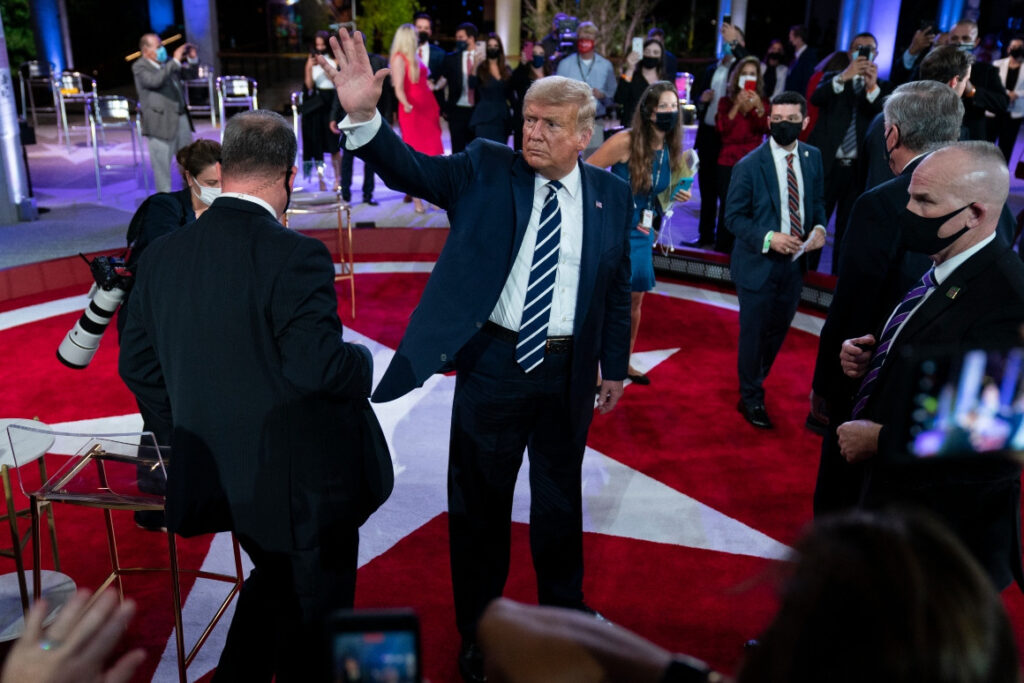32 Reasons Why Trump Still Has My Vote
Four years ago, I knew I couldn’t vote for Clinton, but I wasn’t impressed by Trump either. I had hoped for a different GOP nominee. I seriously considered voting third party. Paying attention to Trump’s campaign, however, I was impressed by his ability to manipulate his environment to his favor, his ability to tailor his message to specific audiences, and his awareness of popular opinion on different topics. However, he earned my vote on just two topics: his enthusiasm for renegotiating international treaties and his explicit support for school choice and alternative education. In the four years since I cast that vote, I have not been disappointed, and I am now a firm supporter of the Trump administration. In no particular order, here’s why Trump gets to keep my vote.
- Unlikability: I am deeply suspicious of politicians who try to be likable. Trump has not made that effort, and I respect him for it.
- Treaty renegotiation: I personally believe that all international treaties and agreements should have a sunset clause. Many of America’s treaties are allowed to limp along far past their useful lifespan or the point at which the circumstances leading to those agreements have completely changed. While Trump has not made a policy of reexamining all treaties, he has refused to behave as though they are sacrosanct. His policies concerning TPP, NAFTA/USMCA, the Iran “Deal” (granted, not actually a treaty), and INF Treaty, among others are a really good start.
- School choice/alternative education: Trump has followed through on his promises to support both and has instructed the Department of Education to make policy accordingly. If I were a single-issue voter, this would be my issue. All parents should have autonomy in educational choices, and the current system of strict districting in public schools is discriminatory.

- University audits: Trump instructed the Department of Education to audit various high profile universities, and those audits uncovered a whole bunch of illegal and unreported contributions from foreign entities, leading to arrests. This is exactly the kind of work the Department of Education should be doing, and American universities have received a free pass for far too long.
- Foreign aid: The administration has made a policy of reducing or revoking foreign aid and favorable trade agreements with countries and entities that openly oppose America’s best interests (Pakistan and the Palestinian Authority are notable examples). American support certainly shouldn’t be on the condition of other governments becoming our yes-men, but the United States also should not give money to countries that don’t want to be our allies.
- Criminal justice reform: The American justice system has desperately needed reform for a very long time. The changes Trump has supported only scratch the surface, but they are meaningful and effective.
- International legalization of homosexuality: One of the less publicized policies of this administration has been the reconsideration of aid and support to countries that do not legalize homosexuality. Regardless of religious belief on the topic, it should not be within the government’s purview to police consensual bedroom behavior or sexual attraction.
- Balance of State/Federal Authority: While Trump has not been reluctant to swing around Federal power when necessary, he has generally respected the autonomy of the states. For instance, he has carefully limited federal involvement in the COVID-19 response, deferring to state governments whenever possible. At the same time, he has not hesitated to involve federal authorities in issues such as race riots or border control when state governments have been unable or unwilling to enforce the rule of law. He has also made federal assistance contingent on state cooperation with federal law and regulations.

- Military policy: The Trump administration has not sought out new military involvement anywhere. Instead, the last four years have seen remarkable draw downs in both Iraq and Afghanistan and a refusal to become embroiled in Syria or Libya. The United States is also significantly reducing its military presence in Germany after 75 years, is negotiating reduced presence in Japan and South Korea, and has announced plans to withdraw from Somalia.
- Russia: Far from being the Russian lap dog the press would have us believe him to be, Trump has frequently refused to play ball with Putin. The Trump administration has sold weaponry to Ukraine, courted contracts to sell natural gas to Eastern Europe (in direct competition with the Russian government), contributed to reduced global oil prices (to the detriment of the Russian economy), and is moving troops from Germany to Poland. By refusing to expand military involvement in the Middle East and North Africa, Trump has also created room for Russia to overextend itself in foreign quagmires while conserving American military energy.
- Taiwan: The administration’s increasing hints at recognizing Taiwan as an independent nation are important to me, and the reluctance of prior presidents to the same has been an embarrassment.
- South China Sea: The administration has been unabashed in supporting various south Asian countries against China’s aspirations to maritime dominance in the South China Sea, including efforts to broker a defense agreement with Australia, India, and Japn.
- North Korea: While talks ultimately fell apart, Trump’s willingness to meet and negotiate with Kim Jong Un earned him serious brownie points in my book, especially when those talks resulted in the return of the remains of our servicemen.
- Knowing his audience: The President has shown remarkable skill in addressing specific audiences without naming them directly. He has deliberately been polite, even complimentary, to unsavory figures (Kim Jong Un, for instance), knowing that negotiations won’t go very far if they don’t start with politeness and at least lip service to the legitimacy of the other party’s position. Likewise, he has asserted his own position with an awareness of the cultures involved (being demanding with Middle Eastern authorities and willing to play the seniority card in east Asia). In the US, he has stepped away from the Republican party line in some cases, to talk directly to working class constituents, who are largely centrist and traditionally registered Democrats.
- Acting on popular opinion: Trump rarely commits to a political position until opinion polling supporting that position has been published. In the case of American abortion law, Trump refused to pin himself to the pro-life position of the GOP until opinion polling demonstrated clear, popular support for increased regulation and a gestational cut-off. The refusal of the press to acknowledge those numbers allows Trump to use his chosen position on the topic to cast himself as in-step with the public rather than as towing the party line or that of a particular party subgroup. He has taken a similar tack on a wide variety of issues, both in foreign and domestic policy.
- Not being ideological: Trump’s insistence on working with popular opinion and tailoring his messaging to his audience are both examples of him not being ideological. While some would condemn this as pandering, I think it’s admirable. The American president should generally be a centrist, as he is supposed to represent the whole of the country, not just a single party or interest group. American governance should be based on compromise, so having someone flexible at the helm is a good start.
- Salary donation: Trump has donated each of his paychecks to various causes within the federal government. I sincerely hope this practice becomes a tradition with future administrations.
- Operation Lady Justice: In March of 2020, Trump signed an executive order establishing a special task force to reopen cold cases of missing Native American women (a demographic that is more likely to go missing or be subject to violence than the general population). Initially, the task force worked with Native groups in Alaska, but it has since expanded to working with major reservations throughout the country.
- Reducing cooperation with the EU: The European Union is highly dependent on American support, especially in the realm of defense, but often opposes American policy. The EU’s continued success or failure should be dependent on the merits of its own governance, not American good will.

- Support for Brexit: Part of Trump’s non-cooperation with the EU has been his unerring support for the UK’s break with the EU. That support has been made tangible with the negotiation of trade deals with the UK in the aftermath of Brexit
- Israel: Like most American conservatives, I wholeheartedly support the president’s decision to move the American embassy in Israel to Jerusalem and acknowledge Jerusalem as the capital of Israel.
- Greenland: The seemingly off-the-wall suggestion that American should buy Greenland from Denmark is an excellent example of how the president has used his platform to draw the attention of the American public to serious political issues they normally wouldn’t consider. In this particular case, Trump drew attention and serious conversation to the issue of international activity and claims in the Arctic just by getting the press to mock him for a proposal that has been made by other administrations.
- Ending the moratorium on federal executions: I support the death penalty for certain crimes, but I also disapprove of the expense and time involved from conviction to execution. The United States has placed itself in a ridiculous limbo on the subject of the death penalty, in which death row inmates are more likely to die on death row than be executed. The country should make a decision one way or the other. In the meantime, we should enact the laws on the books and carry out the sentences handed down by our courts.
- Mid-East Peace Negotiations: The normalization of diplomatic relations between Israel and the United Arab Emirates, Bahrain, and Sudan, with the possibility of similar agreements with Morocco and Oman in the offing, is a huge accomplishment for this administration. It’s high time that the governments of the world stopped capitalizing on conflict, bigotry, and bloodshed in the Middle East.
- Border Control: No, I’m not talking about “The Wall,” although the extension and reinforcement of walls/fencing across the desert have been impressive. Trump’s enlistment of Mexico to control its own southern border and encourage migrants to settle and work in Mexico, and cooperation with our southern neighbor to create economic opportunity zones in Mexico are policies that seriously benefit both countries.
- Federal hiring requirements: The administration has directed federal agencies to rewrite their hiring requirements to emphasize skills and experience over formal education. This policy opens up federal jobs to people who have not benefited from access to higher education, especially people from poorer families, and will help the country ease back from the devaluing of higher education that has occurred over the last 20 or so years.
- Foster care and adoption reform: This is a big one for me. It is administration policy to reduce the number of children removed from their natal families, reduce the amount of time removed children spend in foster care, improve cooperation between child welfare agencies and local services, increase recruitment and retention of foster and adoptive families, increase access of foster and adoptive families to support services and respite care, and reduce the separation of siblings in foster care.
- Human trafficking: Trump has made human trafficking a visible issue in his administration. Not only has he dedicated money to combating it, but his commitment to border security has resulted in real action in reducing the trafficking of people across international borders.
- ACA (Obamacare): While the administration did not succeed in “repeal and replace” with regards to ACA, it did end the individual mandate, which is a tangible benefit to my life and the lives of many of my loved ones.

- Title VI reform: In a time of increasing antisemitism on campus, an executive order defined antisemitism for the purposes of Title VI, and has led to the censure of some universities for the failure to protect Jewish students.
- Born Alive Infant Protection: That this is partisan at all is a crying shame. It’s even more shameful that Congress was unable to pass a bill to the same effect. Trump did the right thing by taking matters into his own hands on this occasion.
Overall, the Trump administration has doggedly pursued meaningful policies and reforms both at home and abroad. All too often, those efforts have been ignored by the press or unsung by the administration, in favor of its preferred talking points. These accomplishments, sometimes conservative, but often non-partisan, are noteworthy and the mark of a president who isn’t in this just for his own ego and place in history, but to do the job with which he has been entrusted to the best of his ability. Donald Trump has done the work to earn my continued support on Tuesday.







